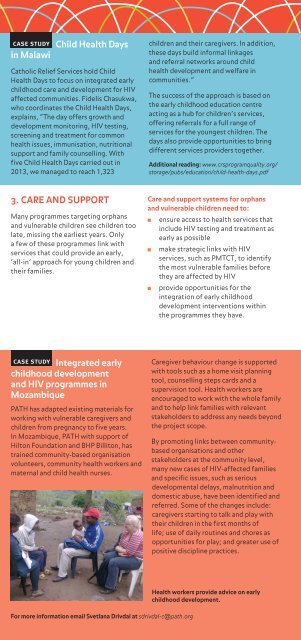Now more than ever” a need to reach the youngest children affected by HIV AIDs
Now more than ever” a need to reach the youngest children affected by HIV AIDs
Now more than ever” a need to reach the youngest children affected by HIV AIDs
Create successful ePaper yourself
Turn your PDF publications into a flip-book with our unique Google optimized e-Paper software.
case study<br />
in Malawi<br />
Child Health Days<br />
Catholic Relief Services hold Child<br />
Health Days <strong>to</strong> focus on integrated early<br />
childhood care and development for <strong>HIV</strong><br />
<strong>affected</strong> communities. Fidelis Chasukwa,<br />
who coordinates <strong>the</strong> Child Health Days,<br />
explains, “The day offers growth and<br />
development moni<strong>to</strong>ring, <strong>HIV</strong> testing,<br />
screening and treatment for common<br />
health issues, immunisation, nutritional<br />
support and family counselling. With<br />
five Child Health Days carried out in<br />
2013, we managed <strong>to</strong> <strong>reach</strong> 1,323<br />
<strong>children</strong> and <strong>the</strong>ir caregivers. In addition,<br />
<strong>the</strong>se days build informal linkages<br />
and referral networks around child<br />
health development and welfare in<br />
communities.”<br />
The success of <strong>the</strong> approach is based on<br />
<strong>the</strong> early childhood education centre<br />
acting as a hub for <strong>children</strong>’s services,<br />
offering referrals for a full range of<br />
services for <strong>the</strong> <strong>youngest</strong> <strong>children</strong>. The<br />
days also provide opportunities <strong>to</strong> bring<br />
different services providers <strong>to</strong>ge<strong>the</strong>r.<br />
Additional reading: www.crsprogramquality.org/<br />
s<strong>to</strong>rage/pubs/education/child-health-days.pdf<br />
3. CARE AND SUPPORT<br />
Many programmes targeting orphans<br />
and vulnerable <strong>children</strong> see <strong>children</strong> <strong>to</strong>o<br />
late, missing <strong>the</strong> earliest years. Only<br />
a few of <strong>the</strong>se programmes link with<br />
services that could provide an early,<br />
‘all-in’ approach for young <strong>children</strong> and<br />
<strong>the</strong>ir families.<br />
Care and support systems for orphans<br />
and vulnerable <strong>children</strong> <strong>need</strong> <strong>to</strong>:<br />
■■<br />
■■<br />
■■<br />
ensure access <strong>to</strong> health services that<br />
include <strong>HIV</strong> testing and treatment as<br />
early as possible<br />
make strategic links with <strong>HIV</strong><br />
services, such as PMTCT, <strong>to</strong> identify<br />
<strong>the</strong> most vulnerable families before<br />
<strong>the</strong>y are <strong>affected</strong> <strong>by</strong> <strong>HIV</strong><br />
provide opportunities for <strong>the</strong><br />
integration of early childhood<br />
development interventions within<br />
<strong>the</strong> programmes <strong>the</strong>y have.<br />
case study Integrated early<br />
childhood development<br />
and <strong>HIV</strong> programmes in<br />
Mozambique<br />
PATH has adapted existing materials for<br />
working with vulnerable caregivers and<br />
<strong>children</strong> from pregnancy <strong>to</strong> five years.<br />
In Mozambique, PATH with support of<br />
Hil<strong>to</strong>n Foundation and BHP Billi<strong>to</strong>n, has<br />
trained community-based organisation<br />
volunteers, community health workers and<br />
maternal and child health nurses.<br />
Caregiver behaviour change is supported<br />
with <strong>to</strong>ols such as a home visit planning<br />
<strong>to</strong>ol, counselling steps cards and a<br />
supervision <strong>to</strong>ol. Health workers are<br />
encouraged <strong>to</strong> work with <strong>the</strong> whole family<br />
and <strong>to</strong> help link families with relevant<br />
stakeholders <strong>to</strong> address any <strong>need</strong>s beyond<br />
<strong>the</strong> project scope.<br />
By promoting links between communitybased<br />
organisations and o<strong>the</strong>r<br />
stakeholders at <strong>the</strong> community level,<br />
many new cases of <strong>HIV</strong>-<strong>affected</strong> families<br />
and specific issues, such as serious<br />
developmental delays, malnutrition and<br />
domestic abuse, have been identified and<br />
referred. Some of <strong>the</strong> changes include:<br />
caregivers starting <strong>to</strong> talk and play with<br />
<strong>the</strong>ir <strong>children</strong> in <strong>the</strong> first months of<br />
life; use of daily routines and chores as<br />
opportunities for play; and greater use of<br />
positive discipline practices.<br />
For <strong>more</strong> information email Svetlana Drivdal at sdrivdal-c@path.org<br />
Health workers provide advice on early<br />
childhood development.


